Bastille Day celebrates a key moment in French history, marking the birth of the Republic and the fight against tyranny. The article explores its historical significance, various celebrations across France, and the national pride it embodies. Discover the traditions that highlight unity and resilience among the French people while understanding common misconceptions about this important day.
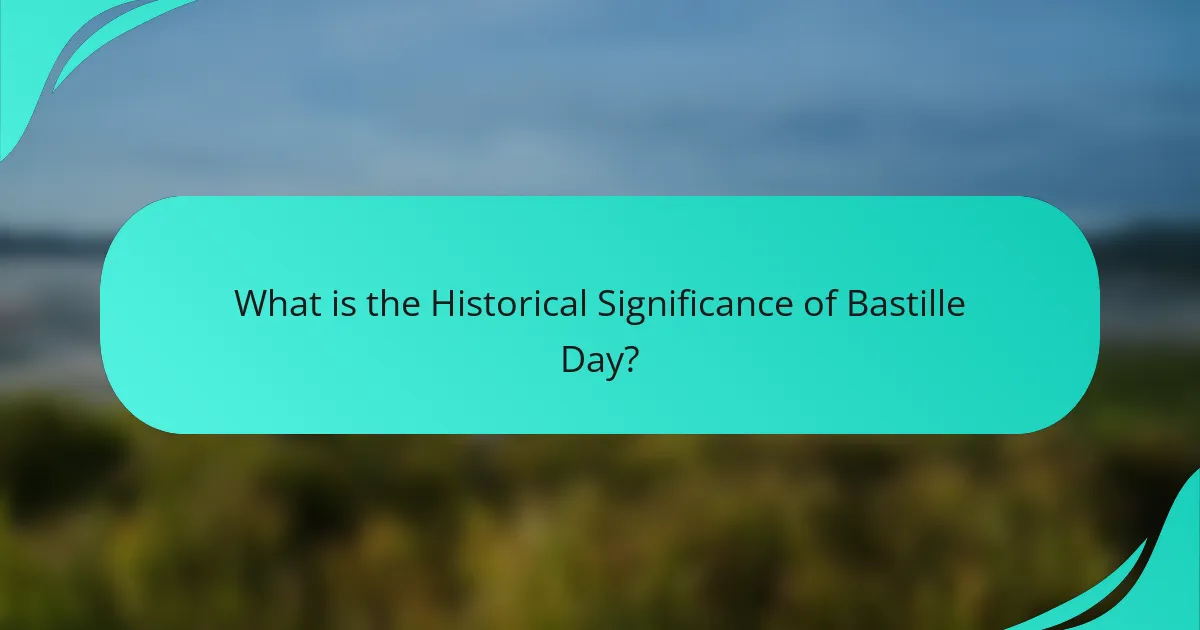
What is the Historical Significance of Bastille Day?
Bastille Day marks a pivotal moment in French history, symbolizing the birth of the Republic and the fight against tyranny. Celebrated on July 14, it commemorates the storming of the Bastille prison in 1789, which ignited the French Revolution. This event signifies the struggle for liberty and equality, fostering national pride. The day is marked by parades, fireworks, and communal celebrations, reflecting the unity and resilience of the French people. Bastille Day serves as a reminder of the ongoing pursuit of democratic ideals and social justice.
How Did the Storming of the Bastille Influence the French Revolution?
The storming of the Bastille on July 14, 1789, marked a pivotal moment in the French Revolution, symbolizing the fight against oppression. This event galvanized the revolutionary spirit, leading to widespread uprisings across France. The fall of the Bastille represented the collapse of royal authority and the birth of popular sovereignty. As a result, it inspired citizens to challenge the existing social and political order, ultimately contributing to the establishment of a republic. The significance of Bastille Day persists today, celebrated as a national holiday symbolizing freedom and unity in France.
What Role Did Bastille Day Play in Shaping Modern French Identity?
Bastille Day significantly shaped modern French identity by symbolizing liberty, unity, and national pride. The annual celebration on July 14 commemorates the storming of the Bastille in 1789, marking the beginning of the French Revolution. This event fostered a sense of shared history and values among citizens.
The festivities include parades, fireworks, and communal gatherings, reinforcing national cohesion. Celebrations reflect France’s commitment to democratic ideals and the principles of the Republic. The unique attributes of Bastille Day highlight its role in promoting cultural heritage and national identity, fostering a sense of belonging among the French people.
As a result, Bastille Day remains a powerful expression of France’s revolutionary spirit and a reminder of its ongoing pursuit of liberty and equality.
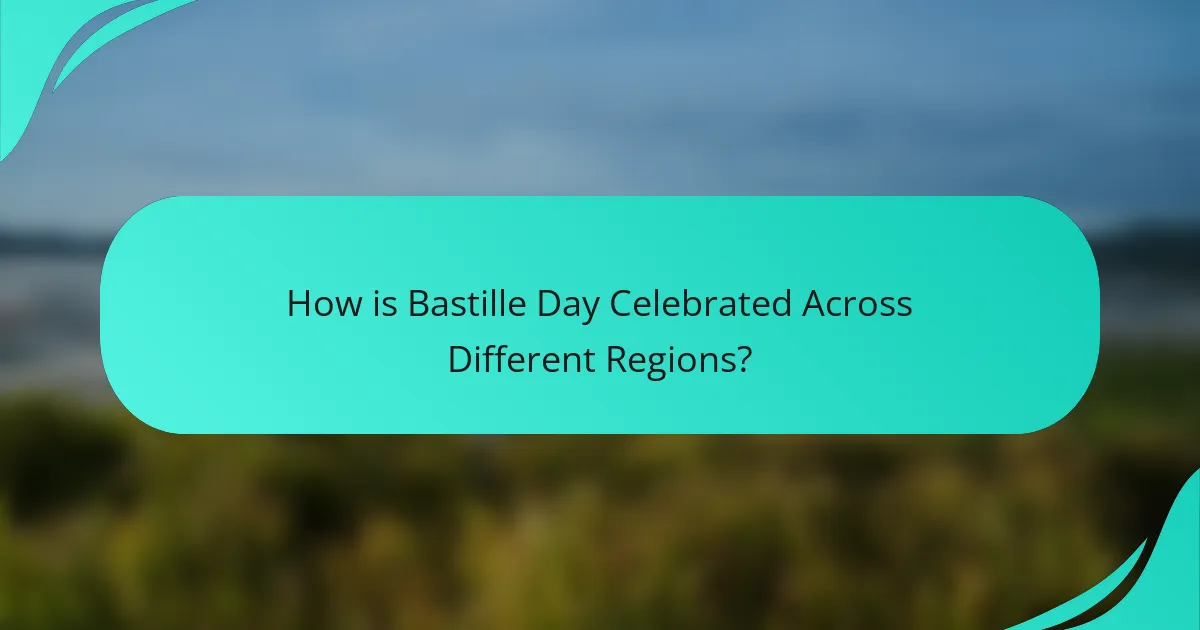
How is Bastille Day Celebrated Across Different Regions?
Bastille Day is celebrated with various traditions across France and its regions. Major cities like Paris host grand parades, fireworks, and public concerts. In smaller towns, local festivities often include community gatherings, traditional music, and food fairs. Unique regional customs, such as fireman balls in some areas, reflect local culture. Each celebration embodies national pride and unity, showcasing France’s rich history and diverse heritage.
What Are the Main Events and Parades in France on Bastille Day?
Bastille Day features significant events and parades across France, notably in Paris. The most prominent event is the military parade on the Champs-Élysées, showcasing France’s armed forces. This parade, held on July 14, includes over 4,000 soldiers, aircraft flyovers, and displays of military equipment.
In addition to the parade, cities across France host fireworks, concerts, and public parties. Notable fireworks displays occur at the Eiffel Tower, attracting thousands of spectators. Local celebrations often include traditional music, dance, and communal meals, reinforcing national pride and unity.
How Do Canadian Cities Honor Bastille Day?
Canadian cities honor Bastille Day through various celebrations that reflect French culture and heritage. Events include parades, fireworks, and cultural festivals, showcasing French music, cuisine, and art. Cities like Montreal and Ottawa host large gatherings, emphasizing community spirit and national pride. These festivities strengthen ties between Canada and France, highlighting shared values of liberty and democracy.
What Unique Celebrations Occur in French Territories?
Bastille Day is celebrated with unique traditions across French territories, showcasing local culture and national pride. In Guadeloupe, festivities include vibrant parades and traditional music, reflecting the island’s heritage. In Martinique, the day features fireworks and community gatherings, emphasizing unity. Reunion Island celebrates with a blend of French and Creole influences, including local cuisine and dance. French Polynesia showcases its cultural identity through traditional performances and ceremonies, highlighting its unique attributes. Each territory’s celebration adds to the rich tapestry of French national identity.

Why is Bastille Day Associated with National Pride?
Bastille Day symbolizes national pride due to its representation of liberty and the fight against oppression. The storming of the Bastille on July 14, 1789, marked a pivotal moment in the French Revolution, embodying the values of freedom and equality. Celebrations include parades, fireworks, and communal gatherings, reinforcing a shared national identity. This day serves as a reminder of France’s commitment to democratic ideals and social justice, fostering unity among its citizens.
How Does Bastille Day Foster a Sense of Unity Among French Citizens?
Bastille Day fosters unity among French citizens by commemorating shared history and national identity. This annual celebration marks the storming of the Bastille in 1789, symbolizing the fight for liberty and equality. The day encourages collective participation through parades, fireworks, and communal gatherings, reinforcing a sense of belonging. As citizens engage in these activities, they strengthen their connection to France’s revolutionary ideals and each other, enhancing national pride and solidarity.
What Symbols of Freedom Are Prominently Featured on Bastille Day?
The symbols of freedom prominently featured on Bastille Day include the French flag, the Marianne figure, and the Phrygian cap. These symbols represent liberty, equality, and the spirit of the French Revolution. The French flag, with its tricolor of blue, white, and red, embodies national pride and unity. Marianne, a personification of the Republic, symbolizes the values of freedom and reason. The Phrygian cap, often associated with liberty, signifies the fight against oppression. Together, these symbols reflect the enduring ideals celebrated on this significant national holiday.
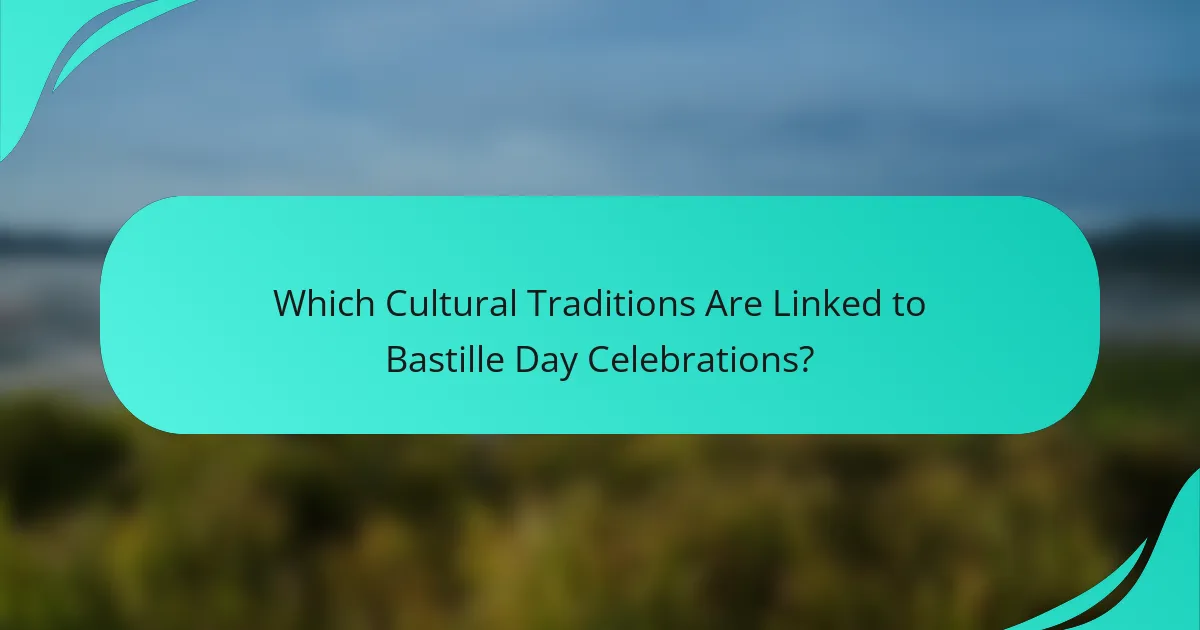
Which Cultural Traditions Are Linked to Bastille Day Celebrations?
Bastille Day celebrations are linked to various cultural traditions that emphasize freedom and unity. These traditions include fireworks, parades, and communal gatherings. The most notable event is the military parade on the Champs-Élysées, showcasing national pride and historical significance. Additionally, many regions host local festivities, reflecting unique cultural identities while celebrating the shared values of the French Revolution.
How Does Culinary Culture Enhance the Festivities?
Culinary culture significantly enhances Bastille Day festivities by celebrating French heritage through traditional foods. Dishes like coq au vin and ratatouille evoke national pride and foster community connections. Sharing meals during these celebrations reinforces cultural identity and unity. The emphasis on local ingredients showcases France’s diverse regional flavors.
What Role Does Music and Dance Play in Bastille Day Celebrations?
Music and dance are central to Bastille Day celebrations, symbolizing national unity and cultural pride. They enhance the festive atmosphere and allow people to express their joy and patriotism. Traditional French songs and lively dances create a sense of community among participants. Events often feature performances that highlight the rich cultural heritage of France, reinforcing the historical significance of the day. These artistic expressions serve as a reminder of the values of liberty, equality, and fraternity that Bastille Day commemorates.
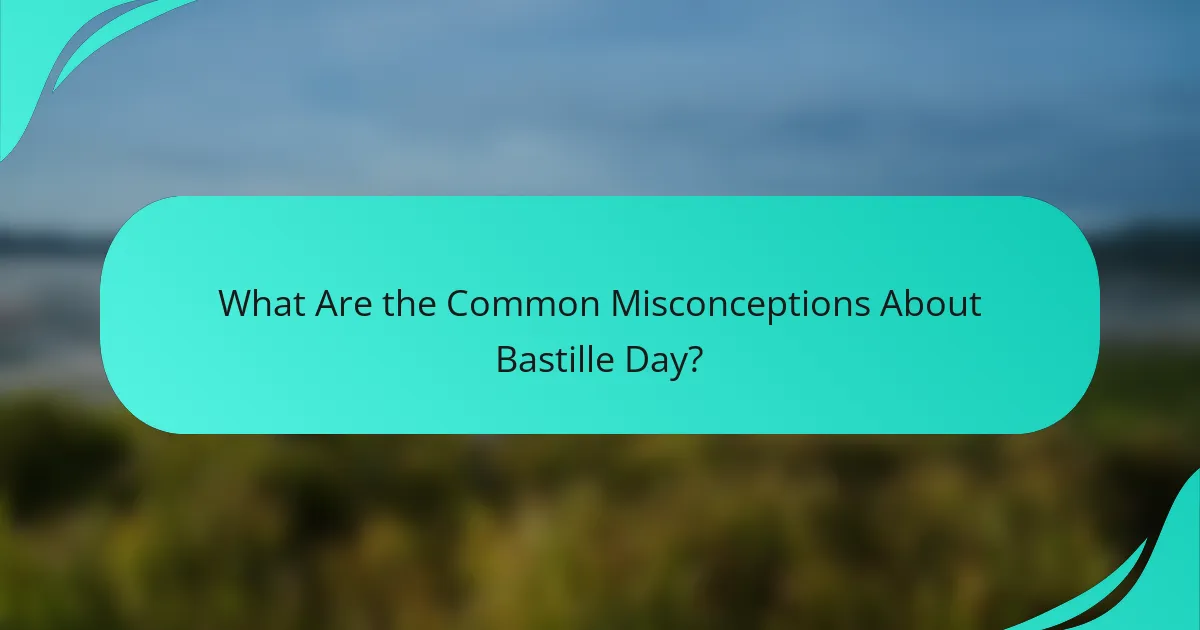
What Are the Common Misconceptions About Bastille Day?
Bastille Day is often misunderstood, leading to several misconceptions. Many believe it solely commemorates the storming of the Bastille prison, overlooking its broader significance in the French Revolution. Some think it is merely a day of fireworks and parades, neglecting the deep-rooted national pride and historical reflection it represents. Additionally, people may assume that all French citizens celebrate it uniformly, while regional variations in festivities exist. Lastly, the idea that it marks the end of monarchy in France is misleading, as the revolution was a complex process with multiple phases.
How Has Media Representation of Bastille Day Evolved Over Time?
Media representation of Bastille Day has evolved from a focus on revolutionary significance to a celebration of national pride. Initially, media highlighted the historical events of 1789, emphasizing liberty and equality. Over time, coverage shifted towards festivities, showcasing parades, fireworks, and communal gatherings. This transformation reflects a growing sense of national identity and unity among the French people. Today, media often portrays Bastille Day as a symbol of French culture and heritage, reinforcing patriotic sentiments.
What Are Some Myths Surrounding the Events of July 14th?
Many myths surround Bastille Day, often misrepresenting its historical significance. One common myth is that it marks the start of the French Revolution; however, it symbolizes the uprising against tyranny. Another misconception is that the storming of the Bastille was a violent and chaotic event, while it was more of a strategic seizure of arms. Additionally, some believe that Bastille Day is solely a celebration of French independence, but it actually commemorates the values of liberty, equality, and fraternity. These myths can obscure the true meaning of the day, which celebrates national pride and unity in France.
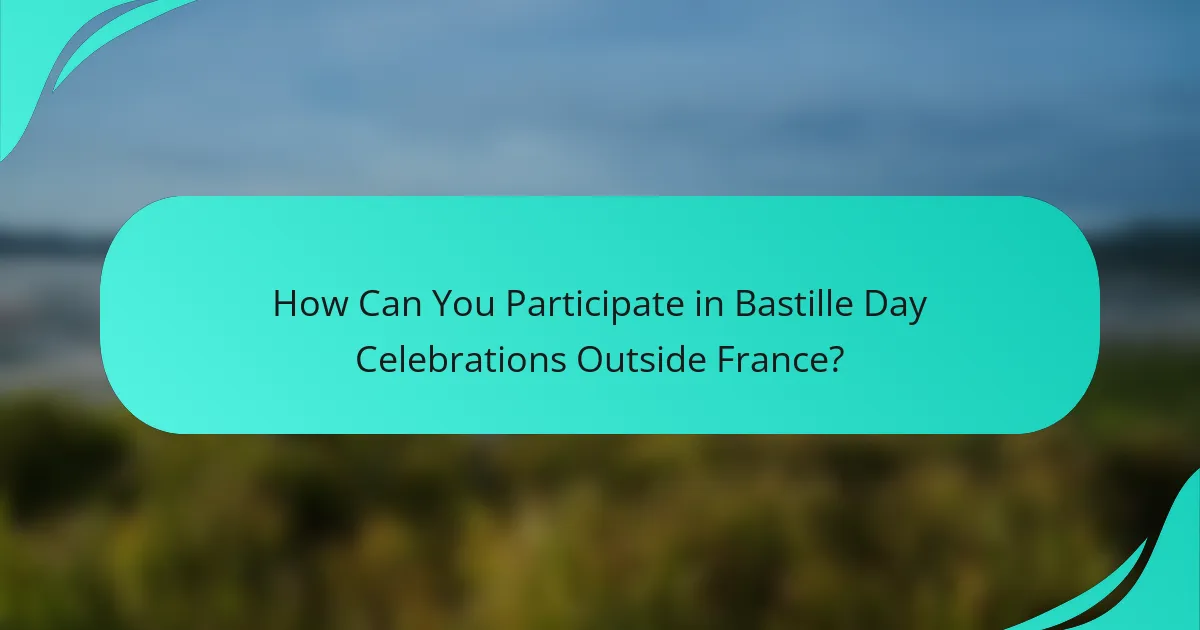
How Can You Participate in Bastille Day Celebrations Outside France?
You can participate in Bastille Day celebrations outside France by attending local events, joining community parades, and enjoying French cuisine at restaurants. Many cities host fireworks, concerts, and cultural festivals that commemorate this historic occasion. Engaging with French cultural organizations can also enhance your experience.
What Activities Can You Organize to Celebrate Bastille Day Locally?
Organize local activities like parades, fireworks, community picnics, and cultural performances to celebrate Bastille Day. These events foster national pride and commemorate the historical significance of the day.
1. Parades showcasing French culture and history.
2. Fireworks displays to symbolize liberation.
3. Community picnics featuring French cuisine.
4. Cultural performances including music and dance.
5. Art exhibitions highlighting French artists.
6. Historical reenactments to educate attendees.
Which Resources Are Available for Learning About Bastille Day?
Numerous resources are available for learning about Bastille Day, including books, documentaries, and online articles. Books like “Bastille Day: A History” provide detailed accounts of the events. Documentaries showcase celebrations and historical significance. Websites dedicated to French history offer articles and educational materials. Museums in France often have exhibitions related to Bastille Day. Online courses on platforms like Coursera cover French culture and history, including this national holiday.
What Are Best Practices for Hosting a Bastille Day Event?
To host a successful Bastille Day event, focus on engaging activities, authentic cuisine, and cultural significance. Create a festive atmosphere with decorations in the French national colors: blue, white, and red.
1. Plan activities that reflect French culture, such as live music, dance performances, or art exhibitions.
2. Offer traditional French dishes like ratatouille, coq au vin, and pastries to enhance the culinary experience.
3. Incorporate historical elements, such as storytelling sessions about the French Revolution and its impact on democracy.
4. Encourage community participation through parades or themed contests to foster national pride and unity.
